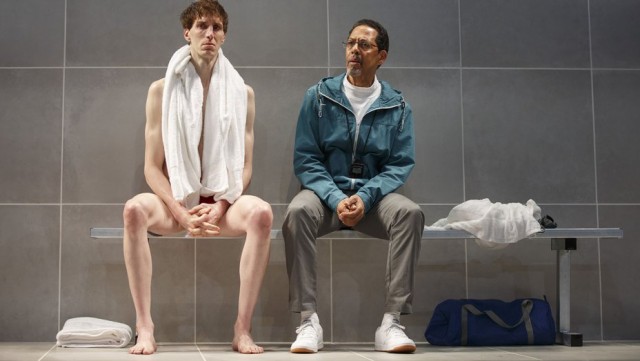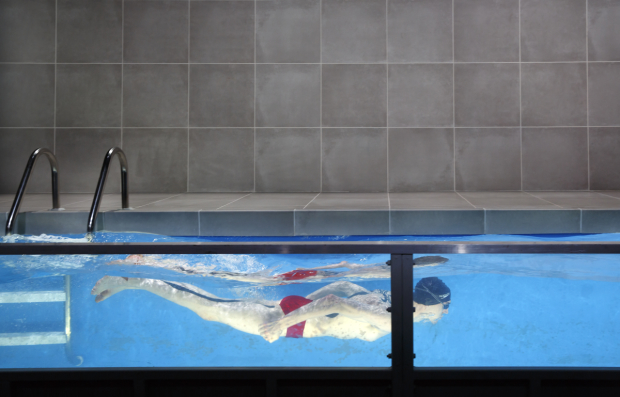
Ray (Alex Breaux) and his coach (Peter Jay Fernandez) discuss strategy in RED SPEEDO (photo by Joan Marcus)
New York Theatre Workshop
79 East Fourth St. between Second & Third Aves.
Tuesday – Sunday through April 3, $69
www.nytw.org
Upon entering the theater at NYTW to see Lucas Hnath’s Red Speedo, you are met with the familiar smell of chlorine; at the foot of the stage is a horizontal tank filled with water, the glow from its soft, calming waves glistening on the back wall of Riccardo Hernandez’s spare but comfy locker-room set. Over the speaker system, the soft, calming waves of Roy Orbison’s glorious voice, singing his posthumous 1989 hit single, “You Got It,” repeat on a loop (that might leave you not wanting to ever hear the song again, no matter how much you think you love it). Soon Peter (Lucas Caleb Rooney), a bearded lawyer, is threatening a swimming coach (Peter Jay Fernandez) that if he doesn’t flush the cooler-full of performance-enhancing drugs he found in his refrigerator — which swimmer Ray (Alex Breaux), Peter’s younger brother, says belongs to one of his teammates, Tad — Peter will take Ray to another swim club, even with the Olympic trials scheduled for the next day. Tall and impossibly sinewy and wearing nothing but a red Speedo, Ray, who is expected to compete for a medal in the Olympics, is standing between the two men as they talk at each other in an almost Mamet-like barrage of unfinished thoughts and sentences. “It is my responsibility to inform the officials, the powers that be, that one of my swimmers has been taking performance-enhancing drugs,” the coach says. “It’s an ethical responsibility.” But Peter, a middling lawyer who sees representing Ray as his way to financial success, starting with an endorsement deal with Speedo, threatens, “Yes, you should do what you need to do. I’m just trying to remind you of what you need.” When Ray informs Peter whom the drugs really belong to, it sets in motion a series of confrontations in which ethics and morality face off against fame and fortune and everyone, including Ray’s former girlfriend, Lydia (Zoë Winters), has to make life-changing decisions that affect more than just themselves.

Ray (Alex Breaux) does what he does best in RED SPEEDO at New York Theatre Workshop (photo by Joan Marcus)
Red Speedo plays out like an individual medley race; its pacing and story aligns with the competition in which the swimmer goes from the butterfly to the backstroke to the breaststroke to freestyle. The start of each new act is signaled by the same kind of air-horn blast that kicks off races — while also making sure the audience has not dozed off. The action might take place in the world of sports, but the story, at its core, is about addiction. People can be addicted to winning just as they are addicted to drugs, alcohol, sex, gambling, porn, and even shopping. The day I saw the show, there was an added buzz in the theater, as news was breaking that tennis champion Maria Sharapova had admitted to using PEDs and was facing a major ban, making the show’s central topic even more relevant. It’s almost impossible to take your eyes off of Breaux (The Real Thing, Bushwick), who’s onstage virtually the entire show, always in his absurdly tight red Speedo, displaying a stupendously large black serpent tattoo running down his back and leg; he injects amiability and even a little sympathy into a not-very-bright character who seems harmless enough but is imbued with a raging selfishness. Breaux, who played football at Harvard and is a Juilliard graduate, works well with Rooney (Love and Information, The Orphans’ Home Cycle), who lends older brother Peter a worried desperation, as if Ray’s potential success is his only way out of his mundane, average existence.
Breaux does not have that same connection with Winters (Love and Information, 4000 Miles); there is no, er, chemistry between the two — who both appeared in the 1994 Shakespeare in the Park production of Much Ado About Nothing — and it is hard to believe that the street-smart Lydia, who used to deal in elicit pharmaceuticals, could really fall in love with the dimwitted athlete who might be a wiz underwater but is a rather dull tool on firm ground. Fernandez (All the Way, Father Comes Home from the Wars) is effective as the conflicted coach who is determined to do the right thing but is caught up in something that is new for him. Hnath (The Christians, A Public Reading of an Unproduced Screenplay About the Death of Walt Disney) and director Lileana Blain-Cruz (Hollow Roots, A Guide to Kinship and Maybe Magic) leave some gaping plot holes, primarily never satisfactorily addressing how the guilty swimmer has not gotten caught despite being tested regularly, and they sometimes settle for the lowest common denominator instead of challenging the audience more. Perhaps Red Speedo, which has plenty of merit, would have been better if it were built with more, shorter races rather than with several longer ones, with a more concrete focus instead of trying to rush too many elements into an already overlong eighty minutes. And then, when it’s all done, Orbison comes back, promising, “Anything you want, you got it. / Anything you need, you got it. / Anything at all, you got it. / Baby!”